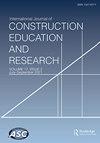The Adaptability of Sustainability Education in Quantity Surveying Degree Programs in Sri Lanka: The Industry Perception
Q1 Social Sciences
International Journal of Construction Education and Research
Pub Date : 2022-07-15
DOI:10.1080/15578771.2022.2100017
引用次数: 0
Abstract
ABSTRACT Bridging the existing gap in sustainability education among quantity surveyors in Sri Lanka, the study aimed to analyze how sustainability education could be incorporated into the curricula of quantity surveying degree programs conducted by the higher education institutions in the country. The study used a mixed-methods approach, which included semi-structured interviews with three experts, a questionnaire survey conducted among 78 quantity surveyors, and expert interviews with 15 senior academics. Thirty-nine sustainability knowledge areas were identified from the semi-structured interviews. Using the survey findings, a mapping chart was prepared to identify the knowledge gaps in sustainability education. The results indicated that several sustainability-related knowledge areas with substantial gaps require enhancement. The barriers that hinder sustainability education and the measures that could be used to overcome those barriers were identified through expert interviews with senior academics. The key identified barriers include lack of sustainability in curriculum development, heavy workload of the students, and lack of knowledge of the academic staff. Incorporating the required knowledge areas in compulsory modules, updating curricula with new knowledge areas, adopting sustainability within the education environment, and developing awareness among the educational community are some of the measures that would help overcome the identified barriers.斯里兰卡工料测量学位课程中可持续发展教育的适应性:行业认知
摘要:为了弥补斯里兰卡工料测量师在可持续教育方面的差距,本研究旨在分析如何将可持续教育纳入该国高等教育机构的工料测量学位课程。该研究采用了混合方法,包括对三位专家进行半结构化访谈,对78名工料测量师进行问卷调查,以及对15名资深学者进行专家访谈。从半结构化访谈中确定了39个可持续发展知识领域。根据调查结果,编制了一个地图图表,以确定可持续发展教育方面的知识差距。结果表明,一些与可持续发展相关的知识领域存在较大差距,需要加强。通过与资深学者的专家访谈,确定了阻碍可持续教育的障碍和可用于克服这些障碍的措施。确定的主要障碍包括课程开发缺乏可持续性,学生工作量大,以及学术人员缺乏知识。将所需的知识领域纳入必修单元,用新的知识领域更新课程,在教育环境中采用可持续性,以及提高教育界的认识,这些都是有助于克服已确定障碍的一些措施。
本文章由计算机程序翻译,如有差异,请以英文原文为准。
求助全文
约1分钟内获得全文
求助全文
来源期刊

International Journal of Construction Education and Research
Social Sciences-Education
CiteScore
3.80
自引率
0.00%
发文量
19
期刊介绍:
The International Journal of Construction Education and Research is a respected international refereed journal that publishes original works that address cutting edge issues related to construction around the globe. The Journal supports the mission of the Associated Schools of Construction (ASC), a professional association comprised of about 100 universities and colleges. The ASC encourages the sharing of ideas and knowledge and promotes excellence in curricula, teaching, research and service relating to the construction industry.
 求助内容:
求助内容: 应助结果提醒方式:
应助结果提醒方式:


